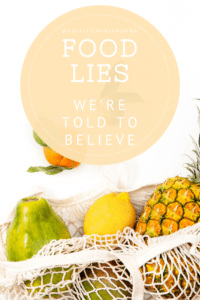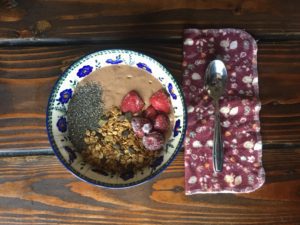 You probably have certain memories that pop up when you think of food. The sights, smells, and tastes can bring back a memory of your grandma’s kitchen (my food triggers are sugar cookies and the smell of chicken & dumplings!) When you think of your childhood, you may think of mac-n-cheese, granola bars, fruit snacks, & Twix cereal. The unfortunate fact is that these foods aren’t as nutrient dense as the companies would love for you to believe. They also have many additives that are not good for your body. When you begin to dig deep, you actually find many food lies that you’re told to believe.
You probably have certain memories that pop up when you think of food. The sights, smells, and tastes can bring back a memory of your grandma’s kitchen (my food triggers are sugar cookies and the smell of chicken & dumplings!) When you think of your childhood, you may think of mac-n-cheese, granola bars, fruit snacks, & Twix cereal. The unfortunate fact is that these foods aren’t as nutrient dense as the companies would love for you to believe. They also have many additives that are not good for your body. When you begin to dig deep, you actually find many food lies that you’re told to believe.
Another outrageous thing?? Many companies like Kraft & General Mills add harmful food dyes to your food in the US, but they replace food dyes with fruit and vegetable juices in Europe. When food is on the shelves, you assume that the FDA has tested it and it’s additives. The reality is, the FDA relies on the companies to submit proof that this things are safe.
Is the food on the shelf safe?

If you’re still trusting that the FDA is allowing healthy and safe food on your shelves, then why do food companies not use food dyes in the European Union? Well, their government has required that food dyes have a warning label stating that these “may cause adverse effects on activity and attention in children.” When we lived in Europe, I saw first hand how these big food companies were changing their ingredients and labels.
In the US, the food media does a great job at marketing. They market things as healthy or for kids by using the media and ‘experts’ (usually government organizations like the FDA). But the messed up part? Our government get funding from these very food and chemical organizations!
What the “Experts” Say
Have you ever read a headline or watched a news story that confused you on what is healthy? You’re not alone. Conflicting information about our food is everywhere we turn. “Experts” are brought in to tell about why something is good for you or isn’t as good as it’s claimed to be. And you may think that taking hearing a government employee recommend something would mean that you’re getting an unbiased opinion. But the sad truth is, these food and chemical organizations are funding our government and research projects that are in their favor.
If you’re still trusting government organizations to care about your health, let’s take a look at the food the American Heart Association (AHA) has put their ‘Heart Healthy’ stamp on:
- Cheerios
- I Can’t Believe It’s Not Butter
- Pork
- Beef
- Deli Meat
If you’ve ever eaten a bowl of Cheerios, you’ll know that they don’t keep you full and they’re not packed full of heart protecting nutrients. Eating pork and beef are linked to increasing HDL (“bad” cholesterol). Deli meats harm also your health and the environment in the production process. It’s cooked in plastic, which you should never do! The brand of deli meat that is ‘heart healthy’ doesn’t even list their ingredients on their website, which is another red flag. And margarine like “I Can’t Believe It’s Not Butter” should be a hard stop for each and every person.
Not So Great Food Recommendations by the AHA 
Staring in the 1960s, margarine was tooted as the ‘healthy’ alternative because it didn’t contain dietary cholesterol. What it did contain was a partially hydrogenated oil packed with not-so-heart-healthy trans fat. In “I Can’t Believe It’s Not Butter” you’ll see palm oil, soybean oil, and those mystery hide-whatever-you-want-in-it “natural flavors”. Although these are plant based oils, a common misconception is that plant based means healthy. But when you process plants and pick one element to use, you’re not receiving the vitamins and minerals that fight off disease and illness from the plants (check out some more plant based myths here).
On the flip side, we’ve seen the food industry try to spread the food lie that things aren’t healthy. In the late 1990s, a study concluded that fiber actually didn’t decrease your risk of colon cancer. So read a title like that and you may think ‘screw it’, but dig deeper and you’ll see they were looking at fiber supplements, not food containing fiber. Eating naturally fibrous foods, means you also get antioxidants, vitamins, and minerals. All of which help to fight off cancers, chronic disease, and illness.
You’ve also seen the food industry doing this with coconut oil. The AHA spoke about how they don’t know who’s recommending coconut oil, “but it’s not scientists”. Here are some studies supporting coconut oil. What he should have said was “not our scientists”. Of course, they recommend canola, soybean, corn, and olive oil instead. Now, I’m not saying to use coconut oil and smear it on every orifice of your body, but I’ll choose not to take advice from a man who isn’t against frying or deep frying in a heart healthy diet. Keep in mind that olive oil became the ‘healthy’ oil when it was obsessed that those on a Mediterranean diet had lower rates of heart attack and were healthier weights. What they didn’t include was the fact that the mediterranean diet is FULL of fruits and vegetables. Could that really be what causes the heart healthiness?
“There’s nothing wrong with deep frying as long as you deep fry in a nice unsaturated vegetable oil.” – Frank Sacks, M.D., lead author of the advisory [against coconut oil] and professor of cardiovascular disease prevention in the department of nutrition at the Harvard School of Public Health
So What Do All the Labels Really Mean?
A poll done by Michigan State University reported that 66% of people are influenced by food labels, so companies are getting tricky. We see the label of ‘organic’ or ‘natural’ and think it means healthy. But the facts are companies have figured out how to mimic ingredients like MSG with plant based alternatives. MSG is the ingredient that causes you to over eat leading to obesity, can give you a headache, disrupt hormones, and more. It’s in fast food and many processed food products. If you see ‘yeast extract’ or glutamate, you’ll also want to put that food back. Yeast extract acts on the body as MSG does and causes you to not feel satisfied. Since we have started eating real, whole foods, we’ve noticed that we no longer eat to the point of feeling like we’ll pop. Another food lie you’ll is ‘natural flavorings’. Natural flavorings in the food world is as ‘fragrance’ is in the beauty world and can hide all kinds of ingredients.
Unfortunately, just like the AHA’s heart healthy list, companies have to pay to use organic labels. If you think about it, it should really be the opposite! But if you see 100% organic on a label, only organic ingredients (which means no GMOs) have been used. The USDA’s certified organic label means 95% of the ingredients are organic and non-GMO. ‘Made with organic ingredients’ means that only 70% of those ingredients are required to be organic and non-GMO. Terms like “natural”, “no artificial flavors/colors”, “zero calorie/fat/carbs”, “vegan”, “plant based” or other related words and phrases. These look good on paper, but don’t tell you what is in the entire product.
How to Find Healthy Food 
Shopping on the outer ring of the store and buying foods without labels will be one of the best ways to get healthy food for you and your family. If you want a processed foods like tortilla chips or chocolate chips, find a brand you trust to buy.
Wanting to learn more about how to eat healthy? You’ll want to read this! Also, if you’re looking for some healthy, plant based recipes to add to your recipe book, have five of my favorites sent right to your inbox.
I want to hear from you! Share your thoughts on food lies you’ve believed to be true & pin this post for later.

Leave a Reply